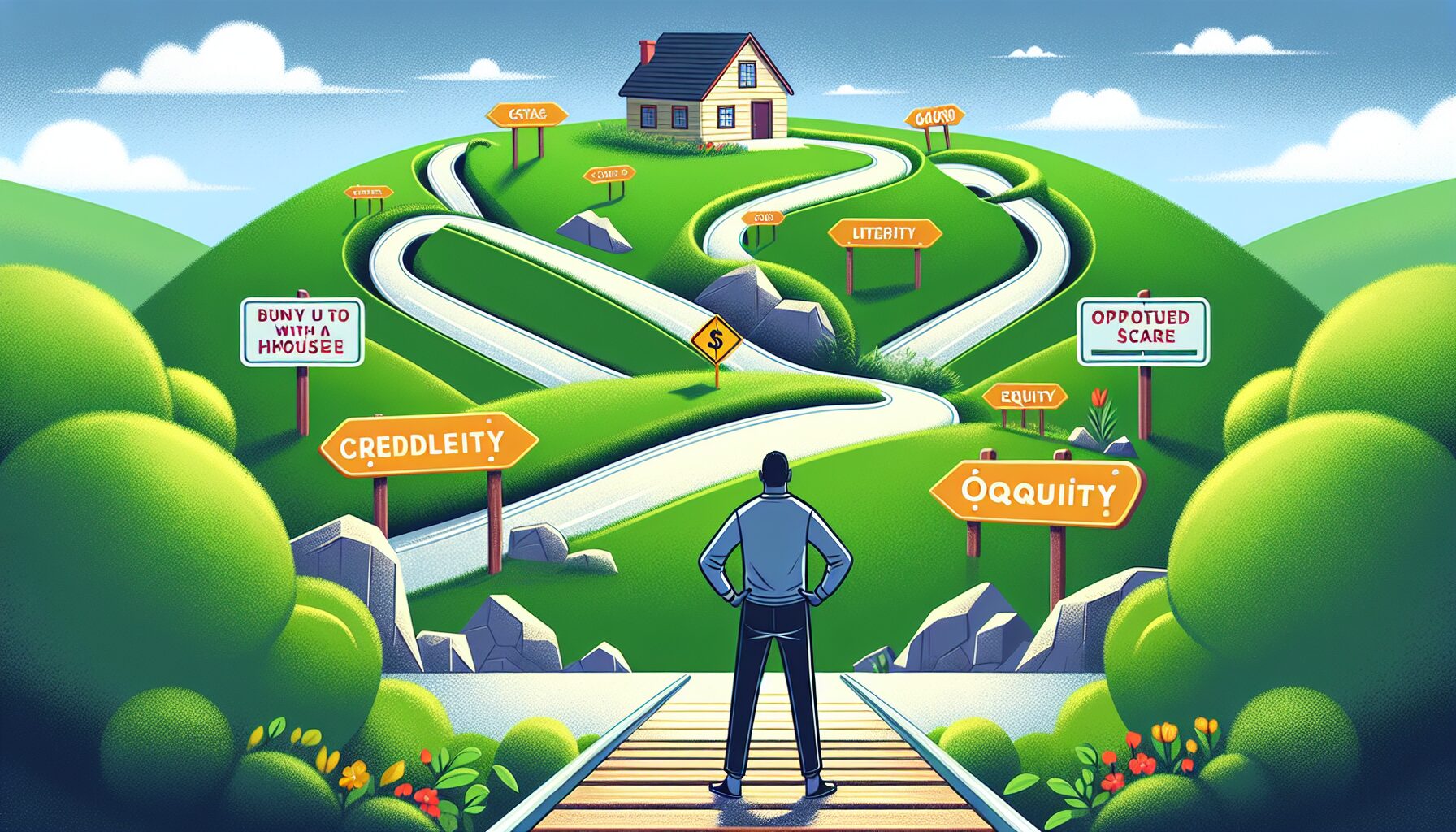
So, you’ve been wondering if it’s possible to buy a house with a credit score of 600. Well, the answer is not a simple yes or no. While a credit score of 600 may not be the highest, it’s not necessarily a deal-breaker either. In this article, we’ll explore the factors that come into play when buying a house with a credit score of 600 and provide you with some helpful insights to make your dream of homeownership a reality. Exciting, isn’t it? Let’s get started!

Table of Contents
Factors That Affect Buying a House
Credit Score Requirements
One of the most important factors that affects your ability to buy a house is your credit score. Your credit score is a numerical representation of your creditworthiness, and lenders use it to evaluate your ability to repay a loan. Different loan programs have different credit score requirements, so it’s crucial to understand what score is needed for the type of loan you’re considering.
Down Payment
Another important factor to consider when buying a house is the down payment. A down payment is a percentage of the purchase price that you pay upfront. The size of your down payment can affect the interest rate you’ll qualify for and can even determine whether you’re approved for a loan. Generally, a larger down payment will make lenders more willing to approve your loan application.
Income and Employment History
When applying for a mortgage, lenders will also want to evaluate your income and employment history. They want to ensure that you have a stable source of income that will enable you to make your mortgage payments on time. Lenders typically look for a consistent employment history and may require recent pay stubs and tax returns to verify your income.
Debt-to-Income Ratio
Your debt-to-income (DTI) ratio is another factor that lenders consider when determining your ability to buy a house. Your DTI ratio is the percentage of your monthly gross income that goes towards paying your debts. Lenders prefer a lower DTI ratio as it indicates that you have more disposable income available to make your mortgage payments.
Interest Rates
Interest rates play a significant role in your homebuying process as they directly impact the overall cost of your mortgage. Lenders determine your interest rate based on several factors, including your credit score, loan type, and market conditions. It’s important to have a good understanding of how these factors affect interest rates so that you can make an informed decision when choosing a loan.
Credit History
Your credit history is a record of your borrowing and repayment activities. Lenders use it to assess your creditworthiness and determine how likely you are to repay your debts. A positive credit history with a track record of on-time payments can increase your chances of being approved for a mortgage. On the other hand, a negative credit history, such as a history of missed payments or bankruptcy, can make it more challenging to secure a loan.
Understanding Credit Scores
The Basics of Credit Scores
Credit scores are three-digit numbers that range from 300 to 850 and reflect your creditworthiness. They are a tool used by lenders to evaluate the risk associated with lending you money. Credit scores are calculated based on information in your credit report, such as your payment history, credit utilization, length of credit history, types of credit, and recent credit inquiries.
Credit Score Ranges
Credit scores are typically categorized into different ranges, such as poor, fair, good, and excellent. The exact range varies among credit reporting agencies, but generally, a credit score below 600 is considered poor, while a score above 700 is considered good or excellent. Lenders have their own credit score requirements, and it’s important to know where you stand in order to understand the loan programs you may qualify for.
Importance of Credit Scores
Your credit score is a critical factor in the homebuying process as it can affect the interest rate you receive, the loan programs you’re eligible for, and whether lenders approve your loan application. A higher credit score generally translates to more favorable terms and conditions on your mortgage. It’s essential to maintain a good credit score by practicing responsible credit management and making timely payments.
The Minimum Credit Score Required
Credit Score Requirements for Different Loan Types
Different loan programs have different minimum credit score requirements. FHA loans, which are backed by the Federal Housing Administration, generally require a minimum credit score of 580 to qualify for a low down payment. Conventional loans, which are not insured or guaranteed by the government, typically require a minimum credit score of 620. VA loans, available to eligible veterans and active-duty military personnel, usually have more flexible credit score requirements. USDA loans, which are designed for low-to-moderate income borrowers in rural areas, may require a minimum credit score of 640.
FHA Loans
FHA loans are a popular option for first-time homebuyers or those with lower credit scores. They are insured by the Federal Housing Administration, which allows lenders to offer more flexible requirements. While the minimum credit score requirement is 580, borrowers with scores between 500 and 579 may still qualify with a higher down payment.
Conventional Loans
Conventional loans are not backed by a government agency and typically have stricter credit score requirements than FHA loans. Most lenders require a minimum credit score of 620 to qualify for a conventional loan. However, a higher credit score may be necessary to secure a more competitive interest rate.
VA Loans
VA loans are available to eligible veterans, active-duty service members, and military spouses. These loans offer attractive terms and often require no down payment. While there is no strict minimum credit score requirement, most lenders prefer a credit score of 620 or higher for VA loans.
USDA Loans
USDA loans are designed for low-to-moderate-income borrowers in rural areas. These loans offer low-interest rates and may require no down payment. While the USDA does not have a minimum credit score requirement, most lenders prefer a score of 640 or higher.
Improving Your Credit Score
Check Your Credit Report
To improve your credit score, start by checking your credit report for any errors or inaccuracies. If you find any discrepancies, such as accounts you don’t recognize or incorrect payment information, you can dispute them with the credit bureaus and have them corrected.
Pay Off Outstanding Debts
One of the most effective ways to raise your credit score is to pay off outstanding debts. Focus on paying down high-interest credit cards or loans first, as reducing your credit utilization can have a significant positive impact on your score.
Manage Credit Utilization
Your credit utilization ratio is the amount of credit you’re currently using compared to your total available credit. Aim to keep your credit utilization below 30% to maintain a good credit score. Paying off balances and keeping credit card usage in check can help improve your credit utilization ratio.
Avoid New Credit Applications
While it may be tempting to open new credit accounts to improve your credit mix, too many new credit applications can negatively impact your credit score. Each application generates a hard inquiry, which can lower your score temporarily. It’s best to limit new credit applications unless necessary.
Correct Inaccuracies
If you find any inaccuracies or negative items on your credit report that are legitimately yours, consider reaching out to the creditor to work out a solution. In some cases, they may be willing to remove or update the negative information, which can help improve your credit score over time.
Build a Positive Credit History
Building a positive credit history takes time, but there are steps you can take to establish good credit habits. Pay all your bills on time, avoid carrying high balances on credit cards, and keep old credit accounts open to maintain a longer credit history. Over time, these responsible behaviors can help increase your credit score and show lenders that you are a reliable borrower.

Down Payment Options
Importance of Down Payment
The down payment is an essential part of buying a house as it represents your investment in the property. A larger down payment not only reduces the amount you need to borrow but also demonstrates your commitment and financial stability to lenders.
Saving for a Down Payment
Saving for a down payment requires discipline and budgeting. Start by creating a savings plan and setting aside a certain amount each month specifically for your down payment. Consider automating your savings or exploring down payment assistance programs to help accelerate your savings goal.
Low Down Payment Options
If saving for a large down payment seems overwhelming, there are low down payment options available. FHA loans, for example, allow down payments as low as 3.5% of the purchase price. Some conventional loans also offer low down payment options, such as the 3% down payment programs.
Different Loan Programs
Various loan programs cater to different down payment requirements. FHA loans, VA loans, and USDA loans are popular options for low-to-moderate-income borrowers, as they typically require lower down payments compared to conventional loans. Research the different loan programs available to determine which one best suits your financial situation and down payment goals.
Income and Employment Factors
Stable Employment History
Lenders prefer borrowers with a stable employment history. They want assurance that you have a consistent income source to make your mortgage payments. Generally, lenders prefer a two-year employment history in the same industry or field.
Proof of Steady Income
Lenders will require documentation to verify your income, such as pay stubs, W-2 forms, or tax returns. It’s crucial to have these documents readily available and organized to expedite the loan application process.
Debt-to-Income Ratio
Your debt-to-income (DTI) ratio compares your monthly debt payments to your gross monthly income. Lenders prefer a DTI ratio below 43% for most loans, although some loan programs may have more lenient requirements. Keeping your DTI ratio low demonstrates your ability to manage your debts and make your mortgage payments.
Increasing Your Income
If your income is not sufficient to qualify for the loan amount you desire, you may consider taking steps to increase your income. This could involve seeking a promotion or raise at work, taking on additional part-time work, or exploring other income-generating opportunities.

Impact of Debt-to-Income Ratio
Calculating Debt-to-Income Ratio
To calculate your DTI ratio, add up all your monthly debt payments and divide them by your gross monthly income. Multiply the result by 100 to get a percentage. For example, if your total monthly debt payments amount to $1,500 and your gross monthly income is $5,000, your DTI ratio would be 30% ($1,500 divided by $5,000, multiplied by 100).
Acceptable Debt-to-Income Ratio
While the ideal DTI ratio varies among lenders and loan programs, a DTI ratio below 43% is generally considered acceptable for most loans. However, some loan programs may allow higher DTI ratios, especially for borrowers with strong credit histories or compensating factors.
Lowering Your Debt-to-Income Ratio
If your DTI ratio is higher than desired, there are ways to lower it. Paying off outstanding debts, reducing your monthly expenses, or increasing your income can help decrease your DTI ratio. Consider paying off high-interest debts first or consolidating debts to lower your overall monthly payments.
Interest Rates and Credit Scores
How Credit Scores Affect Interest Rates
Credit scores can significantly impact the interest rates you’re offered on your mortgage. Generally, borrowers with higher credit scores are more likely to qualify for lower interest rates. Lenders see a higher credit score as an indication of lower credit risk, which can result in more favorable terms and lower monthly mortgage payments.
Benefits of Higher Credit Scores
Having a higher credit score can offer several benefits when it comes to buying a house. With a higher credit score, you may qualify for lower interest rates, saving you money over the life of your loan. It can also increase your chances of loan approval, give you access to a wider range of loan programs, and potentially allow for a smaller down payment requirement.
Options for Lower Credit Scores
While a higher credit score is generally preferred, there are still options available for buyers with lower credit scores. FHA loans, for example, tend to be more flexible with credit score requirements and can be an attractive option for borrowers with scores below 600. Additionally, some lenders offer specialized loan programs specifically tailored for borrowers with lower credit scores.
Factors Influencing Interest Rates
In addition to your credit score, several other factors can influence the interest rate you’re offered. These factors may include the loan program you choose, the size of your down payment, the current market conditions, and your debt-to-income ratio. It’s important to keep these factors in mind and consider how they may affect your interest rate.

Credit History and Mortgage Approval
Role of Credit History
Your credit history provides a comprehensive record of your borrowing and repayment activities. Lenders use this information to assess your creditworthiness and determine the risk associated with lending you money. A positive credit history with a track record of responsible credit management can increase your chances of mortgage approval.
Negative Credit Events
Negative credit events, such as late payments, collections, or bankruptcy, can have a significant impact on your credit history. These events may lower your credit score and make it more challenging to secure a mortgage. However, it’s important to note that negative credit events are not necessarily permanent, and steps can be taken to rebuild your credit history over time.
Rebuilding Credit History
If you have a poor credit history, it’s not the end of your homeownership dreams. Rebuilding your credit history takes time and requires a disciplined approach. Focus on making all your payments on time, paying off outstanding debts, and avoiding new credit applications. Over time, these positive credit habits can help improve your credit score and demonstrate to lenders that you are a responsible borrower.
Qualifying for a Mortgage with a Poor Credit History
While it may be more challenging, it’s still possible to qualify for a mortgage with a poor credit history. Some lenders specialize in working with borrowers who have credit challenges and offer specialized loan programs. Exploring these options and seeking professional guidance can help you navigate the homebuying process and increase your chances of mortgage approval.
Alternative Options for Purchasing a House
Rent-to-Own Programs
Rent-to-own programs offer an alternative path to homeownership for individuals with lower credit scores or insufficient down payments. These programs allow you to rent a property with the option to buy it at a predetermined price after a certain period. While rent-to-own programs can provide flexibility, it’s essential to carefully review the terms and conditions before entering into any agreement.
Lease with Option to Buy
Similar to rent-to-own programs, lease with option to buy agreements give you the opportunity to rent a property with the option to purchase it in the future. It provides more time for you to improve your credit score or save for a larger down payment while residing in the property. Consider consulting with a real estate professional or attorney for guidance on lease with option to buy contracts.
Seller Financing
Seller financing, also known as owner financing, occurs when the seller offers to finance part or all of the purchase price. This arrangement can be an alternative for buyers who may not qualify for traditional financing due to credit or income limitations. It’s important to negotiate and agree upon the terms and conditions of the seller financing arrangement to ensure it aligns with your financial goals.
Non-Traditional Lenders
In some cases, non-traditional lenders may be willing to work with borrowers who have lower credit scores or unique financial circumstances. These lenders may include private individuals, peer-to-peer lending platforms, or community development organizations. However, it’s crucial to thoroughly research and vet these lenders to ensure they are reputable and offer fair terms.
In conclusion, buying a house with a 600 credit score is possible, but it may require extra effort and consideration. Understanding the various factors that affect homebuying, such as credit scores, down payments, income and employment factors, debt-to-income ratios, interest rates, and credit history, can help you navigate the process effectively. Whether you choose to improve your credit score, explore low down payment options, or consider alternative paths to homeownership, it’s important to approach the process with a proactive mindset and seek guidance from professionals in the industry. With determination and the right steps, you can achieve your goal of buying a house.



